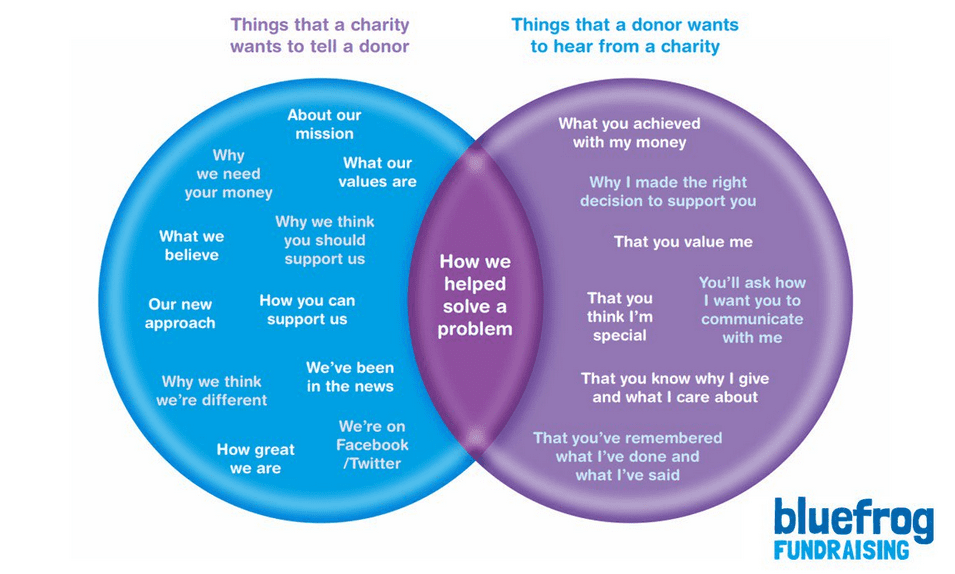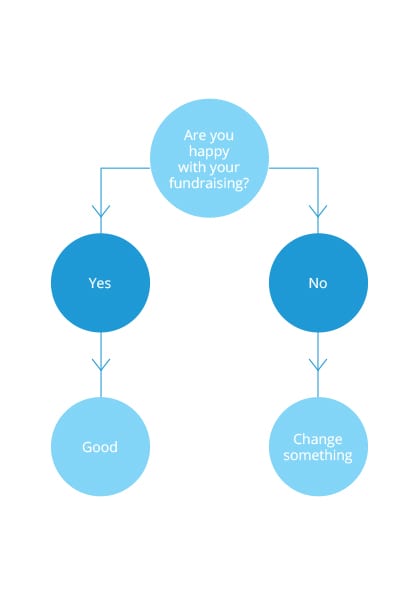Guest post: Adam Rothwell on Face to Face fundraising
London councils are apparently waging a concerted, “malicious” campaign against F2F – or so says the PFRA, who seem to believe that the councils would like nothing more than to clear the streets of chuggers, and – as a result – are happy to see the poor and needy of the world suffer.
The PRFA position is that Chuggers help charities do good work, and so those who campaign against them are morally wrong.
It’s an argument that I can’t accept.
The PFRA’s defence of chuggers follows a standard line that’s also been adopted by the IOF and many fundraising professionals. “Come off it,” they say, “the public doesn’t give spontaneously – and by using chuggers we can recruit donors who wouldn’t otherwise give.”
It’s hard for me to argue with that, so I won’t. But I will argue that this defence misses the point. Although chuggers might rake in the cash, they do so to the detriment of the entire voluntary sector, but in ways that are difficult to measure. Simply, if ordinary people dislike chuggers – over which there’s no disagreement – this means that the public face of charity is, for many, that of a rude, ill-trained, tabard-wearing, pain in the neck. Charities are, in other words, destroying their sainted image, possibly irreparably. And all because some F2F agency offers them a ‘guaranteed return’.
For the long-term health of the sector, it’s vital that charities recognize the negative side-effects of F2F, and have a proper debate about the unintended consequences of the technique. But this important debate hasn’t happened. Perhaps because of the PFRA
It would appear that the PFRA response to criticism is to default to angry mode. So, the London councils are being “malicious,” and have given the PFRA the “cold shoulder” in negotiations. I experienced this approach myself when I appeared on a radio phone-in on F2F last November.
I think the PFRA’s response under attack is counterproductive. It makes the sector seem prickly and defensive, and unable to take even the mildest criticism. It shows no sympathy for people with justifiable complaints against F2F, and accuses those who complain of being either misinformed or even morally unreliable.
The issues around F2F are complex. Yes, it raises cash. But it also causes side-effects that are in chronic need of investigation. And, all the while, the sector’s reputation continues to suffer. The sector’s response to this criticism needs to be measured, and it needs to be constructive. It needs to engage with the legitimate concerns of the irritated public. And it needs to welcome debate.
Adam Rothwell
Note: This is a guest post from Adam Rothwell formerly of Intelligent Giving. His views do not necessarily reflect mine, but I have grown to value what he adds to the various debates within the sector.
Tags In
Related Posts
13 Comments
Comments are closed.
The Essentials

Crack the Code to Regular Giving: Insights, Strategies, and a Special Giveaway!

‘Tis Halloween. Keep to the light and beware the Four Fundraisers of the Apocalypse!

Why do people give? The Donor Participation Project with Louis Diez.

A guide to fundraising on the back of a postcard

What does the latest research tell us about the state of fundraising?









I think the whole argument of defending chugging as its beneficial to charities is completely missing the point. The majority of people that complain about chugging have not go an issue with charities themselves, its all about the manipulative tactics used. I personally won’t give to any charity because of this. People have the right not to be bullied or harrassed in the streets for money even if its for charitable perposes. Also it is a fundamental right that people should be allowed to go about their day to day business without being bullied for money and local councils should and I think are realising this.
Chugging is intrusive and many people don’t like it. Chuggers also harrass and guilt trip people as they walk by. They’ve also been known to lie about their cause. Check on http://www.intelligentgiving.com to find out more information about them.
This form of fundraising is currently unregulated by local councils because they are exploiting a loophole in the law which controls only cash collections and not direct debits.
You’ll be relieved to know that this loophole is about to be closed in 2010 and councils will have the power to stop their dubious practices. I would recommend complaining to your local council licensing debt by sending an email in order the them to tighten up these controls on Chugging in 2010. If you don’t complain, they won’t solve this issue.
and there was me thinking that adam and his “views” were history and the sector could move onto a proper debate about how charities recruit donors. but alas Marky, you have chosen to give him one last chance to spout his person beliefs (prejudices?), which as ever are not backed up by evidence.
the real shame is that the PFRA has to be so vocal in support of face to face because charities who use face to face can’t or won’t stand up and say why they use it.
Surveys by NFP Synergy (another of adams favourites) and the annual report from the FRSB show that face to face is by no means the most hated form of fundraising. but adam rarely sees the need to employ evidence in his arguments and would rather rehash conversations he has had with random people to justify his argument.
Marky, I see on the right hand side that you aspire that this blog “should all be stuff that you can actually use”. Pray tell how a practicing fundraiser should be using this blog in their day to day role?
best wishes,
Rarry
Like the proverbial bad penny…
I find it hard to keep a straight face while being lectured at by Adam Rothwell about PFRA’s and the sector’s need for a “measured and constructive” response to criticism when Adam’s and others’ (witness Bob McInnis’s comments on this thread) have usually been anything but.
Adam Rothwell became obsessed with street fundraising from an early point in his time at Intelligent Giving and never took the time nor trouble to engage with arguments that might have contradicted his entrenched views. Had he done so, he’d have realised that the issues he raises in this blog are the issues that people engaged in F2F are wrestling with every day.
I was reading Nassim Nicholas Taleb’s book The Black Swan a few weeks ago and I turned down the corner of p144 because, as I read the following paragraph, I thought of Adam (and realised I’d probably have to quote it fairly soon).
“Once we produce a theory, we are not likely to change our minds. So those who delay developing their theories are better off. When you develop your opinions on the basis of weak evidence you will have difficulty interpreting subsequent information that contradicts these opinions, even if this new information is obviously more accurate.”
This encapsulates Adam’s position on F2F perfectly.
His so-called research of October 2008 was embarrassing and amateurish and the conclusions he drew from it were not supported by, nor could be inferred from, the data. Yet he still maliciously – yes, maliciously – took unevidenced, sensationalist headlines to the media and then denied any responsibility for how the media used them. Now he has the audacity to complain that we were “angry” about it. Of course we were bloody angry. (Mike Smith – as you so often quote this research, you might like to reread it, especially the methodology.)
I struggle to see how Mark Philips can value Adam’s contributions to this sector when so many have been of such a similarly poor standard (IG’s ‘research’ was nothing the Bluefrog would ever have put its name to).
Adam, you have nothing new to say on this subject and, while I do not wish to resort to ad hominem arguments, I’ll still point out that it’s a rich irony that while you were lecturing everyone else about how to fundraise you were unable to do so yourself for your own charity. As director of IG, you failed to persuade trusts and foundations that yours was a charity they should support (and then blamed the grantmakers for failing to see that rather than yourself for failing to develop a persuasive funding proposal).
You have left the charity sector because you failed as director of Intelligent Giving. You are saying nothing in this blog that you haven’t said before.
And now you are calling for a “proper debate” on street fundraising and blaming the PFRA for standing in the way of this. Yet it is you who for two years have obstructed a proper debate by using a mix of rhetoric, sophistry and selective use of evidence (or just not having any evidence) to attack F2F in a manner designed to put us on the back foot and obscure the issues we should all be talking about just so you could embark upon a personal anti-chugger crusade.
If you genuinely want to get a debate going about F2F, you ought to realise that you are not the right person to lead it. Perhaps you should consider doing the honourable thing: stand aside and let someone better qualified to do so take the helm. Maybe you should withdraw from this debate until such time as you have something novel and, more importantly, constructive to contribute to it.
In the meantime, anyone else who wants to find out more about street or door fundraising, or who does want to start a genuine debate, can contact me on [email protected]. I’ve been at the PFRA for just three months but already I’ve been struck by how many critics of street fundraising actually have very little interest in listening to our arguments.
Ian MacQuillin
Head of communications
Public Fundraising Regulatory Association
Hi Adam,
Can you please evidence your assertion that ‘Simply, if ordinary people dislike chuggers – over which there’s no disagreement’. There is a large disagreement over this issue. Lets start at the point of a decent piece of research that shows that it is the least complained about form of fundraising in the sector bit.ly/14871E .
Professional fundraisers have a responsibility to the people the charity supports. Our job is to raise as much money for our chosen cause as possible. To judge the success or otherwise of our activity we use measurables – KPI’s etc. So in making this conjectural assertion that ‘ordinary people dislike chuggers’ we need to know if this is true or not so we can reassess this activity. Can you provide us with some creditable research please?
Cheers,
Henry
The link hasn’t carried though – I’ll try again:
http://www.theidm.com/resources/archives/research-nuggets/direct-mail-attracts-most-charity-fundraising-complaints/
the silence is deafening.
Hi Henry
I’m afraid I can’t reply on behalf of Adam, but can point out one piece of research that might be of interest. Mintel published a report in March 2008 that showed that 55% of people stated that they “do not like being stopped and asked to make a donation in the street”.
The link follows but unfortunately the report costs £1,500 to buy.
http://reports.mintel.com/sinatra/reports/index/letter=3/display/id=227658
Sorry I can’t be more helpful.
Best wishes
Mark
“55% of people stated that they do not like being stopped and asked to make a donation in the street”. Are you sure this figure doesn’t include cash collections?
Rarry
Hi Rarry
It probably does.
Few tin rattlers actually do much stopping of people though, so I think it is a safe bet that it relates mainly to face to face recruitment.
Best wishes
Mark
I really don’t understand this.
Adam claims he wants a debate on the issue. People put very pertinent points to him to initiate the debate. He declines to respond. If you write things on a blog that you know will spark debate it’s pretty bad form not to engage with the people that read the blog.
I’m off on holiday for 2 weeks. I’m sure (hope) that will give Adam time to come up with the info requested.
Mark – to your point re: the 55% stat. That is interesting and perhaps indicative – do you know what the sample size for the research was? I have a friend that works at Mintel – I’ll see if I can get the research docu gratis!
Cheers,
Henry
Hi Henry
I’m pretty sure the sample size was 1,000.
Hope you enjoyed your holiday.
best wishes
Mark
Adam – what will you be teaching in your new career?
I’d suggest Sociology, particularly the area of ‘media hysteria and moral panics; asylum seekers, paedophiles, chugging…’
I’m sure the Daily Mail will be more than happy to supply you with your background material.
Hi All
Three pieces of research going back to 2004 showing the ups and downs of the public attitude to face to face recruitment in the UK.
2004 – 20% say that street recruitment puts them off donating.
http://www.marketingmagazine.co.uk/news/search/223564/Favourite-brands-Brands-love-brands-hate/
2007 – 60.7% are put off by “charity activists” in the street.
http://www.marketingmagazine.co.uk/news/656433/Brands-Brands-love-brands-hate/
2008 – 56% find “charity muggers” puts them off making donations.
http://www.marketingmagazine.co.uk/news/808535/McDonalds-tops-hated-brands-poll-Beckham-Katona-loathed-celebs/?DCMP=ILC-SEARCH
Best wishes
Mark